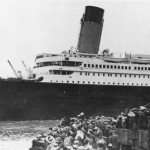Centre County, PA
 Rika put the paper down on the crisp lace tablecloth she’d inherited. As every morning, she had read it stem to stern, but today’s news left a poor taste in her mouth even after reading the comics; she was in no mood to cocoon with the crossword puzzle. She and Jon were lucky. They had a lot of old-world training in their bones, retired early and created a farm just big enough to support the two of them, with room for growth in case any of their three children wanted to take it over or join them. Maybe it was just the residual hippie in them. Everything was paid for, so the pension and social security were for frills. Rika was a general practitioner and Jon was a general contractor; they were able to maintain their lives and those of their family rather independently, especially since their desires were few.
Rika put the paper down on the crisp lace tablecloth she’d inherited. As every morning, she had read it stem to stern, but today’s news left a poor taste in her mouth even after reading the comics; she was in no mood to cocoon with the crossword puzzle. She and Jon were lucky. They had a lot of old-world training in their bones, retired early and created a farm just big enough to support the two of them, with room for growth in case any of their three children wanted to take it over or join them. Maybe it was just the residual hippie in them. Everything was paid for, so the pension and social security were for frills. Rika was a general practitioner and Jon was a general contractor; they were able to maintain their lives and those of their family rather independently, especially since their desires were few.
One of those desires was a fresh-ground and brewed cup of coffee, which they shared each morning on the back porch most of the year. Jon was in his usual polo shirt and chinos, looking fit as ever, since he had the opportunity to continue building things around the farm.
“Jon, did you notice that the head of FEMA was fired, supposedly for mismanagement of funds?”
“Yes, but I know him. He’s an honest man with a heart of gold and a strong sense of purpose. He had to have been set up. Probably ruffled some political feathers. The atmosphere on the Hill is very egocentric, and they hate to part with money for ‘causes’. I didn’t see where a replacement was named, did you?”
“No. In a side bar they mentioned wanting to wait, to find a ‘suitable’ replacement, whatever that means.”
Rika sipped on her second cup of coffee and just listened to the sounds around her. There was a cricket under the porch who was desperately trying to find a mate. Apparently he was unsuccessful, as he’s been chirping for weeks. The cow and horse were grazing. Jon had milked the cow before coffee, since he liked to relax at breakfast without having Bossie complain.
They always seemed to come up with the silliest names for their animals. “Who could have a cow that wasn’t named Bossie?” he asked. It was such a good idea to fence in ten acres and let the animals roam. The chickens squawked regularly but seemed to like roaming around especially near the people. Still, each day was like Easter Sunday as Rika went hunting for eggs. The chickens didn’t seem to feel compelled to lay the eggs in the chicken coop. There were six of them, each laying an egg a day. They were named Eeny, Meeny, Miney, Moe, Larry and Curly. Two eggs for Rika, two for Jon, and two for cooking and baking each day.
While they were certainly aware of subsistence farming, neither wanted to pursue it. So Rika continued her practice with a small number of patients, and Jon couldn’t quit making furniture even though they had already filled the house, so he sold the extras regularly, including requests from visitors to the house and referrals from happy customers.
The couple was, in the vernacular, “comfortable” – wanting for nothing and not wanting a lot. They both had a circle of friends that they got together with about once a month, three children and five grandchildren. They were habitual savers, which has come in handy since the costs of meat and heat have risen.
Tonight was one of the get-togethers with their friends, to be held at Rika’s house. Children over eighteen were also welcomed, but not young ones, because sometimes the conversations got pretty raucous. No topic was off limits, including sex, religion and politics. They were an intelligent bunch, all of whom taught their children to think on their own.
Rika was planning on making some new canapés, a variation on the cucumber sandwich. But just in case, she would also make some of the standards. Her culinary pursuits didn’t always pan out, but it was fun dabbling.
Jon scuffled off to the barn right after breakfast to varnish a desk chair he’d been making for his childhood friend, Ben.
Ben Mason was a civil lawyer. He got accolades in law school, but wanted to avoid criminal work, so he specialized in “anti-corporate” law. Perhaps because of his hippie background, he liked protecting Joe Citizen against the big guns. After he passed the bar, he proposed to Willie (Wilhelmina), an interior decorator he met at a book club. Ben found it easier to explain law to Willie than to understand the profusion and nuances of hues in Willie’s world, but he did try to stay involved with her pursuits. His lanky six-foot-three frame fit nicely with Willie’s statuesque five-foot-ten. Willie loved beautiful things. Sometimes her friends had to temper her desire to own the entire art world. They would admonish her to leave some beauty for the rest of us. To Ben’s eyes, she was part of the art collection, with huge green eyes and rich black hair. Her tall frame hid any evidence of the four children she’d borne.
The first to arrive that evening was Beth. Widowed ten years ago, she didn’t mind living alone. She was a computer consultant and now only took contract work, so she could travel a bit and get to know all parts of the country. Because of the long absences, she has elected not to have pets that would get neglected. To make up for that, she set out food for the deer and wild turkeys in the surrounding woods. There was nothing remarkable about Beth, with her mousy brown hair and ordinary eyes, and with a 5’4” height she remained virtually invisible to the world. Her work also gave her the opportunity to see what is happening in a wide variety of industries; she seemed to absorb everything around her like a learning sponge.
Beth brought a fresh vegetable plate with dips, all from the garden. She had also made a full gallon of her sangria, which was different each time she made it, depending on what fruits were in season and which wine she’d brewed the week before. Her Volvo served her well with all the traveling. She always arrived early, since this was really her only circle of friends, and she looked forward to their get-togethers to think about something other than work. Besides, it wasn’t fair to the host or hostess of the night to have to set up all alone. When Beth hosted, she was always a little behind the eight ball if she was on a contract, and usually just as discombobulated when she wasn’t late, so she knew how it felt.
There wasn’t really any of that rivalry that pervaded the home entertaining of the fifties. These were all old friends who knew the relationships were of far more value than the environs. Rika’s home was very comfortable and roomy, and the chill Pennsylvania evenings were often celebrated with a roaring fire in the living room reflecting off all the bric-a-brac and conversation pieces dotting the room. Everywhere one glances there is a thought-provoking conversation starter, from the Maori wedding necklace to the original Ginny doll.
Beth and Rika were already discussing the curious FEMA situation when Mike and Daisy arrived sporting one of Daisy’s famous cookie platters. Daisy never settled for sugar cookies. Each get together saw five new variations for appraisal. This night her friends could sample spiezel, tiny cherry tarts, spice-cake cookies, chocolate logs and peanut-brittle. Daisy was a real estate broker, appraiser and manager, so she could put aside just about any afternoon to indulge her love of baking. Sometimes she would bring a special pie or cake instead of cookies. She blames her stout build on this love of baking, but probably Mother Nature had more to do with it than anything else, between her German bloodline and six children. Her graying hair complemented her crystal-gray eyes, and she had a blush of health in her skin. It was through Daisy’s real estate connections that Mike came into her life. Mike was an airline pilot who demanded a good deal of her patience and understanding to find him a perfect refuge which they eventually decided to share. Daisy was managing the farm that Rika and Jon came to love. While helping them secure their own hideaway, she found herself often in conversations with them that ran into lunch or dinner. A strong friendship developed which resulted in Mike and Daisy becoming part of “the group”.
Sangria was poured for the five of them as Jon lit up the fire. Mike observed that the situation at FEMA was symptomatic of a lot of benefit organizations, both federal and private. The National Endowment for the Arts had been totally folded; the tight economic times forced the government to redirect these funds into more commercially-viable pursuits. Daisy saw rising mortgage rates threatening real estate; the state tried to ameliorate the crunch by repealing the usury law, so banks could escalate their rates. A lot of Daisy’s clients were coming up with smaller and smaller down payments, hoping they could still manage the monthly mortgage payments. This was alright while inflation was soaring, but with the current situation, people were finding it harder and harder to hold on to their properties. Rental companies and landlords saw that there were going to be many who could no longer afford to buy homes or stay in the ones they owned. This made for a lovely seller’s market, and rental rates went sky high.
Beth observed, “In a way, consulting has been a boom. A lot of companies are forcing their employees to accept pay cuts. Those that won’t are laid off – then re-hired as consultants. The laws protecting consultants from being full-time workers without benefits have been repealed. The companies see this as a financial cream puff. They ‘hire’ the workers back at the same pay rate, but don’t offer medical, pension or life insurance benefits, which saves them a bundle. The consultants don’t get paid sick time or holiday pay. Meanwhile the stockholders don’t see an employee overhead, and anyone can have his or her contract voided without cause. To top it off these workers have to come up with these benefits’ costs out of the same paycheck.”
Rika nodded. “I see this in my practice as well. The insurance companies are increasing co-payments and premiums. My patients are avoiding medical help as they try to scrape up the premiums. Even for myself and Jon, the hospitals are rescinding professional courtesies – we are paying the same as our patients now. People who avoid regular care are ending up hospitalized with serious illnesses. But Medicare and Medicaid are lowering their limits even more, so that almost no one is eligible for financial aid. I’ve had two patients declare bankruptcy strictly because of amassed medical bills.”
At this point Naomi and Zach let themselves in. Since Naomi is an agriculturist, and Zach an expert at animal husbandry, they had spent a lot of time with Rika and Jon while they tried to determine the extent of the “personal farm” to be developed and managed. The new arrivals were both professors at a nearby university and Jon had sought them out for advice. Visits to the farm to check on progress and offer further advice developed into companionship. Both Naomi and Zach reflected their Jewish blood in their appearance, and were advocates of saving the planet, but they held on to their religion more as a philosophy than a ritual practice. Hearing the conversation already in progress, Naomi piped in.
“This is hitting the food industry as well. I like to shop at little specialty markets and butchers, and two of them have already closed. Mom and Pop cannot compete with SuperFoods any more. Corporations have taken over the sources – dairies, cattle ranches, fruit orchards and vegetable farms. Regulations are making it harder and harder for an individual to offer food to the markets and so they are selling out to the big companies. The big companies find it “unfeasible” to continue offering special cuts and produce, so they discontinue them. These nice little places where I used to get specialties and local produce cannot afford to buy and resell.”
Willie sauntered in around seven. Ben had gone directly to the barn to check out the progress on his desk chair. The varnish was still a little tacky, so he resigned himself to sitting in his old beat-up one for another couple of days.
Ben then joined Jon at the barbeque grill to offer unsolicited advice on the proper timing for turning kabobs. Once the kabobs had reached a condition acceptable to both men, they brought them inside.
“Today has been one of the best of this spring,” Jon announced in an effort to banish the look of consternation off the faces of the others. “What type of music shall we listen to tonight?”
The sampling of mood versus jazz, rock and the bossa nova began. They settled on soft rock, to lift the spirits and stir up reminiscences.
Listening to “So Happy Together”, Willie observed that “their generation” (the ages of the group spanned from late 40s to early 60s) was so lucky. They’d gotten the discipline and self-sufficiency training from their depression-era parents, the Happy Days of the 50s, full of innocence and simple goals, and the liberating, eye-opening and empowering 60s, full of hope, love and the belief that they could make a difference.
The ecological changes they tried to institute in the 60s hit a hard road, but by the late 1990s, even green became keen.
With such a good base, life just kept swimming along. They adjusted to the loss of friends in the war, but the Middle East still causes concern for children and grandchildren.
They started a game of remember …
Jon: handlebar mustaches and long sideburns
Willie: dress codes in school
Beth: pinafores
Ben: bell bottoms
Jon: bell bottom hip huggers!!
Rika: yeah, back when we had waists
Daisy: free love and women’s liberation
They all had a grand time testing out the new recipes and sharing memories of crazy old times. Everyone relaxed into speculation of what would be on the bucket list for the future. As the night drew to a close, many of them had things they wanted to look into, to turn the bucket list into real possibilities.
 I love watching soccer; watched every soccer match I could in the Olympics. But, especially in Europe, I won’t attend the games in person because the fans get so crazy that people have been beaten and trampled after a game. Now it looks like American baseball is joining the ranks. This morning (9/8/13) it was announced that a Dodgers fan was killed during a fight with Giants fans in Los Angeles. All the time the Dodgers were in booming bumptious Brooklyn, nothing like this ever happened, even in the Subway Series. Maybe the Dodgers should come home.
I love watching soccer; watched every soccer match I could in the Olympics. But, especially in Europe, I won’t attend the games in person because the fans get so crazy that people have been beaten and trampled after a game. Now it looks like American baseball is joining the ranks. This morning (9/8/13) it was announced that a Dodgers fan was killed during a fight with Giants fans in Los Angeles. All the time the Dodgers were in booming bumptious Brooklyn, nothing like this ever happened, even in the Subway Series. Maybe the Dodgers should come home.

 So far all events have occurred on a case-by-case basis, nurtured by the serendipity of power in the right places. Mike Freedman had been watching with increasing enthusiasm as they unfolded. As Chairman of the Board for IBN, he had a comfortable viewpoint. But can things continue unguided? Mike suspected not; too many options could play out.
So far all events have occurred on a case-by-case basis, nurtured by the serendipity of power in the right places. Mike Freedman had been watching with increasing enthusiasm as they unfolded. As Chairman of the Board for IBN, he had a comfortable viewpoint. But can things continue unguided? Mike suspected not; too many options could play out. Billy Silver woke up five minutes before his alarm was set to go off. Popping the alarm button in, he smiled. One day he’ll need to check if the alarm actually works. Not one for taking things for granted, he thought back on his situation.
Billy Silver woke up five minutes before his alarm was set to go off. Popping the alarm button in, he smiled. One day he’ll need to check if the alarm actually works. Not one for taking things for granted, he thought back on his situation.
 It’s fair to say that America was heading for a financial crisis, one that was affecting the rest of the world as well. The bulk of the federal budget was coming from corporations and wealthy individuals, but the majority of outgoing funds was going out to defense, subsidies for farmers and small business, and assistance for minorities and the labor force.
It’s fair to say that America was heading for a financial crisis, one that was affecting the rest of the world as well. The bulk of the federal budget was coming from corporations and wealthy individuals, but the majority of outgoing funds was going out to defense, subsidies for farmers and small business, and assistance for minorities and the labor force.
 I like to separate the weekends from weekdays for a variety of reasons, even though I am “retired”. As a consultant, I often worked weekends, and when I didn’t I had to run all the errands my workaholic life delayed. So setting up a couple of ‘days of rest’ is a nice break for me. Online vendors for shopping are open, so I can do a little shopping, especially for Christmas or birthdays, without coping with crowded stores. But I can’t contact any businesses or services by phone, so I am relieved from a lot of busy work.
I like to separate the weekends from weekdays for a variety of reasons, even though I am “retired”. As a consultant, I often worked weekends, and when I didn’t I had to run all the errands my workaholic life delayed. So setting up a couple of ‘days of rest’ is a nice break for me. Online vendors for shopping are open, so I can do a little shopping, especially for Christmas or birthdays, without coping with crowded stores. But I can’t contact any businesses or services by phone, so I am relieved from a lot of busy work.

 Rika put the paper down on the crisp lace tablecloth she’d inherited. As every morning, she had read it stem to stern, but today’s news left a poor taste in her mouth even after reading the comics; she was in no mood to cocoon with the crossword puzzle. She and Jon were lucky. They had a lot of old-world training in their bones, retired early and created a farm just big enough to support the two of them, with room for growth in case any of their three children wanted to take it over or join them. Maybe it was just the residual hippie in them. Everything was paid for, so the pension and social security were for frills. Rika was a general practitioner and Jon was a general contractor; they were able to maintain their lives and those of their family rather independently, especially since their desires were few.
Rika put the paper down on the crisp lace tablecloth she’d inherited. As every morning, she had read it stem to stern, but today’s news left a poor taste in her mouth even after reading the comics; she was in no mood to cocoon with the crossword puzzle. She and Jon were lucky. They had a lot of old-world training in their bones, retired early and created a farm just big enough to support the two of them, with room for growth in case any of their three children wanted to take it over or join them. Maybe it was just the residual hippie in them. Everything was paid for, so the pension and social security were for frills. Rika was a general practitioner and Jon was a general contractor; they were able to maintain their lives and those of their family rather independently, especially since their desires were few. I love dogs. I really do. Decades of having those furry little beasts run up to me when I get home; rolling on the living room floor together on a Saturday afternoon; getting slobbery kisses; teaching them to fall down ‘dead’ when I point a finger and say “Bang!”; watching them bounce when it’s time for the Sunday afternoon canned food… so many warm memories. They are loyal and loving, more a family member than many relatives we avoid.
I love dogs. I really do. Decades of having those furry little beasts run up to me when I get home; rolling on the living room floor together on a Saturday afternoon; getting slobbery kisses; teaching them to fall down ‘dead’ when I point a finger and say “Bang!”; watching them bounce when it’s time for the Sunday afternoon canned food… so many warm memories. They are loyal and loving, more a family member than many relatives we avoid.
